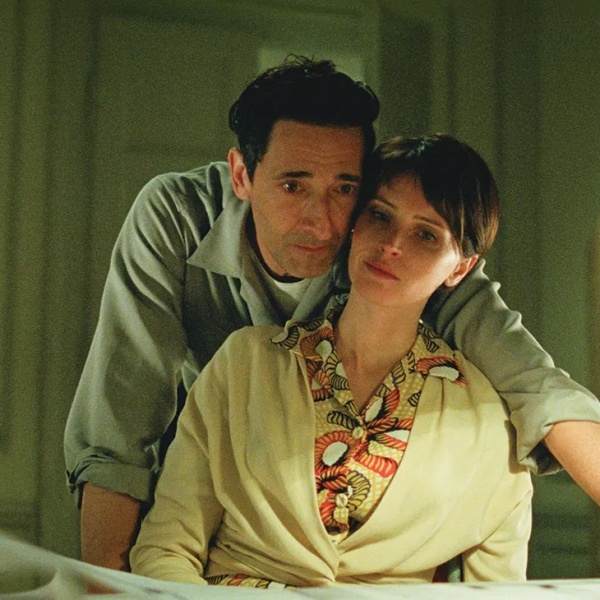There are fun heist movies and there are serious heist movies, and Frederik Louis Hviid’s skeletal but gripping “The Quiet Ones” — based on the biggest Danish robbery ever committed — immediately and unambiguously identifies itself as the latter. It starts in Sweden in 2006, where we ride along with two security guards inside an armored truck as they make an early morning cash delivery. She’s a battle-tested veteran who’s seen it all, he’s a rookie with a new child at home, and both of them will be shot to death within minutes when the latter tries to flee the gang of militarized thieves who ambush their vehicle.
These criminals are not fucking around, and when they resurface in Copenhagen two years later with an eye towards recruiting a local boxer for a massive score, we can’t help but wonder if Kasper (Gustav Giese, chiseled and defaced like a public statue, and only slightly more expressive) is getting in over his head. He’s a bruiser to be sure, but also a loving family man who just wants to make his wife and their young daughter proud. He can’t bear the thought of being a failure, and while there’s no reason to think he might not succeed in the ring, he doesn’t have the patience to punch his way up the ranks. “When am I gonna be champ?,” he asks his trainer. “Start by winning your first fight,” the trainer replies.
The deep scars on Kasper’s face suggest that he’s already suffered a few losses of one kind or another in his life, and he radiates a decency that makes it all too easy for us to hope that he comes out on top, regardless of the shortcut he takes to get there. So when his shady jeweler of a brother-in-law connects him to the mastermind of the Sweden job (a greasy and glowering Reda Ketab as Slimani, who layers the dead-eyed dangerousness of a career criminal with an extra pinch of sadism just to keep us on our toes), our feelings are naturally conflicted. We’re invested in Kasper but not so much for his terrifying killer of a new boss, and that discrepancy only grows more extreme after the needless scene in which Slimani abuses his girlfriend — a telling misstep in a film that struggles to balance its constant potential for violence with the well-oiled professionalism of its thieves.
The not-so-complicated matrix of our sympathies is made a hair more complex by the glancing introduction of a blonde security guard named Maria (Amanda Collin), who Anders Frithiof August’s script — determined to be as ruthlessly efficient as possible — details with all the affection of a typo. All we know about Maria is that she cares about her job, she plays by the rules, and she’ll inevitably cross paths with Slimani’s gang on the fateful night when they ram a bulldozer into the depot where she works.
Needless to say, “The Quiet Ones” — its title alluding to the demeanor of its protagonist, as well as to the unmarked bills he’s trying to steal — is more interested in process than character detail. Emulating the terseness of a Jules Dassin heist thriller while largely eschewing the coolness that tends to come with it, Hviid drills into the nitty-gritty details of the robbery until any sense of moral judgment has seeped out of the equation. It’s unclear if Kasper is made to feel more desperate by the looming threat of the global financial crisis (even though it hovers over the movie with the obviousness of an imminent hurricane), but this isn’t a crime story about a good man who’s forced to make bad choices so much as it’s a veiled tragedy about the need for belonging.
Everyone just wants to feel like they’ve found their place in the world, and while there’s nothing particularly remarkable about Slimani’s master plan (they’re going to block the roads with garbage trucks, pack the cash into stolen Audis, and spike the roads behind them as they peel away from the scene), “The Quiet Ones” mines a palpable sense of personal velocity from the sense of purpose that their Slimani’s recruits bring to their various roles. Like cogs slotting into a crude machine, these men are simply — and eagerly — fulfilling their purpose, which is enough of its own reward that the money almost starts to seem like a means to an end. That may not square with Kasper’s obsession with breaking the record for Denmark’s biggest heist, but I suppose it’s hard to shake free of a champion’s mentality, least of all in a world that’s conditioned people to win at any cost.
Shot in various shades of darkness and smoothed into pure adrenaline with the help of Martin Dirkov’s glassy score, “The Quiet Ones” is pointedly absent the criminal romance that often abets other movies like it. The heist itself makes for an engaging setpiece (how could it not?), but Hviid consistently emphasizes the cold anxiety of pulling it off — an anxiety he refuses to soften with forced camaraderie or exaggerate with unforeseen twists. There’s a blunt reality to the task at hand, and it always returns our attention to the sad fact that Kasper and co. are trying to steal a sense of accomplishment that they’ll never be able to keep.
In a film less afraid to access the humanity of its characters, that might have been enough to make the wildly under-written Maria — so dedicated to the slow grind of her work — feel like a more thoroughly effective foil to the robbers who try to leapfrog their way to success. But in spite of its teflon sheen, “The Quiet Ones” is even-handed enough to recognize a residual despair in the fact that Maria risks her life for a paycheck and a pat on the back. Sure, that’s another way of saying that she’s doing her job, but it may not seem like reward enough when the economy starts to collapse around her. By the time this hard-nosed genre exercises arrives at its ambivalent final scene, whether or not the criminals get away with stealing a few million Krone feels all but irrelevant to a world in which real fulfillment is so hard to keep.
Grade: C+
“The Quiet Ones” premiered at the 2024 Toronto International Film Festival. It is currently seeking U.S. distribution.
Want to stay up to date on IndieWire’s film reviews and critical thoughts? Subscribe here to our newly launched newsletter, In Review by David Ehrlich, in which our Chief Film Critic and Head Reviews Editor rounds up the best reviews, streaming picks, and offers some new musings, all only available to subscribers.







